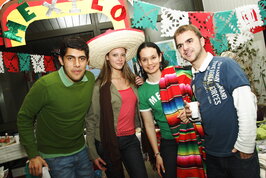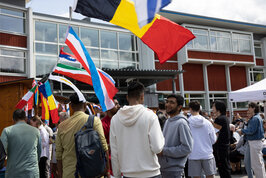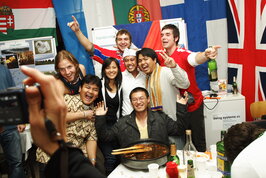
Your adventure is waiting
Studying internationally is a matter of course at HFU! Whether it's our "outgoings" who want to start a semester abroad or "incomings" from all over the world (currently from over 90 countries) who want to spend a semester with us or complete their degree here – we love our diverse community! On this page you will find information about international studies.
Outgoings: from the Black Forest out into the whole world
Study semester abroad
If you are studying at HFU and would like to study abroad, our International Center (IC) will advise and support you! More information on the IC can be found further down on this page.
Basically, you have two options:
- You apply for an exchange study place at an External link opens in a new window:HFU partner university
- You apply as a "freemover" directly to a non-partner university abroad
General information on higher education systems in other countries can be found in the DAAD country information.
Practical semester and/or thesis abroad
Not only can you spend a semester abroad, but you can also gain experience abroad during your internship semester. Almost all of our bachelor's degree programmes include a practical semester as a compulsory internship. The semester in which it takes place is regulated individually for each degree programme.
You can also write your thesis abroad – we will show you which options are available here.
The IC offers HFU students information events on studying abroad every semester. There you can also find out everything about financial support options and funding programmes such as the Foreign BAföG or an ERASMUS+ supplement.
Incomings: from other countries to the Black Forest
Would you like to experience HFU for a semester?
Our International Center (IC, more information on this page below) advises and supports all international students who would like to spend an exchange semester at HFU. Experience HFU onone of our Internal link opens in the same window:three campuses, benefit from our cutting-edge teaching content and – most importantly – make friends for life!
Are you coming to stay?
If you are interested in completing your entire degree programme at HFU, our HFU Bilingual team is available to support you. Our School of Languages and Cultures offers a wide range of language courses where you will study with many other international students. If you would like to study in German, we offer you a preparatory semester with Internal link opens in the same window:HFU Prep so that you can perfect your language skills before you start studying.
ERASMUS+
ERASMUS+ is a funding programme of the European Union. It aims to promote lifelong learning, enable sustainable growth, strengthen social cohesion and European identity and drive innovation. The programme focuses on the topics of inclusion and diversity, digitalisation, political education and sustainability.
Furtwangen University participates in the ERASMUS+ programme and enables students, teaching staff and employees to spend time abroad funded by ERASMUS+ via a broad network of European partner universities.
Scholarships are awarded by the Erasmus Consortium, a central institution of the state of Baden-Württemberg based at Karlsruhe University of Applied Sciences.
International Center (IC)
The International Center is the central point of contact for all foreign students and guests of Furtwangen University as well as for students and academics planning a stay abroad. The International Center is also responsible for the maintenance and further development of international university relations and is the point of contact for all questions relating to the internationalisation of studies, teaching and research.
Team - Responsibilities
Email application is started:Brigitte Minderlein: Head of IC, cooperation, finances, funding programmes, outgoings advice, Erasmus+ Coordinator
Email application is started:Anette Kohler: Deputy Head of IC, Moveon support, outgoings advice, Schwenningen Campus
Email application is started:Ulrike Waldvogel: scholarships, outgoings advice, Furtwangen Campus
Email application is started:Petra Balasta: visiting students, Schwenningen Campus
Email application is started:Julia Hennig: visiting students, Furtwangen Campus, contact for tuition fees for international students
Lucia Schwarz: outgoings advice Schwenningen Campus, nominations, projects
Indra Eckerlin: Academic Service Center, Tuttlingen Campus
School of Languages and Cultures (SLC)
The School of Languages and Cultures (SLC) offers all members of Furtwangen University the opportunity to acquire, improve or deepen their foreign language and intercultural skills.
Over 40 qualified teachers, most of whom are native speakers, teach well over 75 courses per semester to both students and university staff in groups of no more than 23 people. Our aim is to make foreign language teaching modern and innovative by constantly expanding our range of courses and using online modules.
Our School of Languages and Cultures is also a test centre for internationally recognised language tests for German, English and Spanish.
HFU has over 150 partner universities worldwide.
Would you like to study abroad for a semester? It's easy at HFU because we have exchange progammes with universities on all continents.
Our partners








